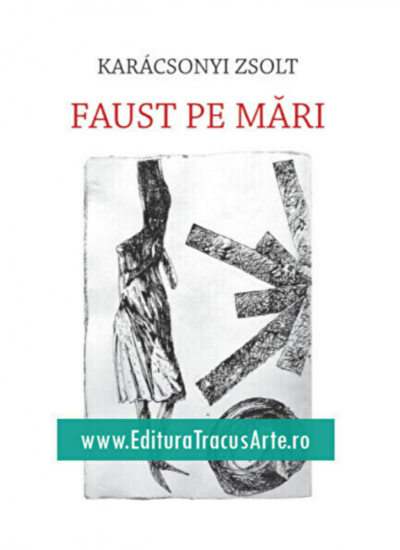Swim, Faust, swim!

Swim, Faust, swim! rewrites the myth of Faustus, taking as its point of departure Christopher Marlowe’s play Doctor Faustus, not Goethe’s poem. It is a philosophical thriller with a completely new ending. To this day, Ússz, Faust, ússz! is Karácsonyi’s most commented poem; it has attracted the attention of many critics, reviewers, and commentators.
There is little doubt that Faust is one of the most distinguished figures in the literary tradition. At the same time, this distinction, given the far-reaching, diversified, and time-consuming nature of this tradition, may now represent a kind of “burden,” as Faust literature can therefore be considered inclusive for the present literary dialogue. The poem by Zsolt Karácsonyi is therefore an important literary undertaking that can be evaluated primarily in the light of this rewriting gesture.
The structure and “history” of the poem also allow for the (otherwise very exciting and multi-layered) reading that all this is not only as a Faust or a Ship, which is in the poem by Zsolt Karácsonyi, but also as an articulation of an attempt to rewrite the Faustian tradition. At this other level, Faust, and then Nimfaust, is the metaphor for the experiment in which the re-writing of the literary tradition that has emerged so far will be the main stake.
Karácsonyi’s esoteric / exoteric philosophical poem - more originally called poetosophy - also mimics the perpetually undulating, yet “in one place, still” shining sea in its structural construction: the three-part structure is built on further triple units, as if a vortex revolves around itself.
Immanent “obscurity” arises from the untraceable nature and radical transformation of references. But not only from this, but from the associative flow of consciousness of the self-examination-like monologue, the self-defined questions and situational answers of the floating Faust, and the metaphors of the very poetic and thus inevitably obscure metaphors of Western poetic vocabulary. For what shall I begin with Life and Death, and Heaven, and even Heaven and Earth, Caesar, Charlemagne, and Scylla and Charybdis? The performance is precisely that this vocabulary here is starting to shine again, it is activated, validly.
The author invites its reader to open up a multi-level network of interpretation that requires active participation.
Zsolt Karácsonyi (1977-) is a leading personality of the Hungarian-language literature in Transylvania. He is the author of several books of poetry and essays on drama. His books of poetry have been issued by publishers from Kolozsvár, Budapest, Csikszereda, and Arad. He has been the editor-in chief of the weekly magazine Helikon issued in Kolozsvár (Cluj) since 2013 and the vice-president of the Erdélyi Magyar Írók Ligájá (The Transylvanian Hungarian Writers’ League). Zsolt Karácsonyi is also a prolific translator of Romanian literature into Hungarian. In recognition of his literary merits, Zsolt Karácsonyi has received numerous literary awards, including the József Attila Award (2018).